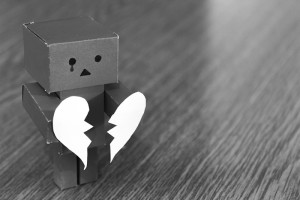 A broken heart isn’t just a metaphor — the sadness that lays heavy on your chest can trigger Takotsubo syndrome, also known as “broken heart syndrome,” but in a recent study published by the European Heart Journal, joyful and happy moments can break hearts too.
A broken heart isn’t just a metaphor — the sadness that lays heavy on your chest can trigger Takotsubo syndrome, also known as “broken heart syndrome,” but in a recent study published by the European Heart Journal, joyful and happy moments can break hearts too.
Takotsubo syndrome is when the heart muscles weaken swiftly and severely by resulting in chest pain that could lead to life-altering consequences, such as a heart attack.
Emotional distress can over stimulate the sympathetic nervous system (fight or flight mode), which could result even in cardiac arrest. While traumatic events can trigger deeper, intense emotions, positive emotions can also have an impact on the cardiovascular system.
Positive emotions — similar to negative emotions — alter heart rate and blood pressure, while increasing the activity of sympathetic and parasympathetic nervous systems. According to European Heart Journal, there’s a 27 percent higher chance that someone experiences a cardiovascular event on his or her birthday more than any other day of the year.
It’s the first time scientists have found a positive cause for the syndrome. This condition and new study is now known as the “happy heart syndrome,” but can have the similar effects on the cardiovascular system.
Author, Christian Templin said joy and sorrow share a common thread, and cardiologists at the University Hospital Zurich agree.
 “We believe that TTS is a classic example of an intertwined feedback mechanism, involving the psychological and/or physical stimuli, the brain and the cardiovascular system,” Templin said. “Perhaps both happy and sad life events, while inherently distinct, share final common pathways in the central nervous system output.”
“We believe that TTS is a classic example of an intertwined feedback mechanism, involving the psychological and/or physical stimuli, the brain and the cardiovascular system,” Templin said. “Perhaps both happy and sad life events, while inherently distinct, share final common pathways in the central nervous system output.”
The amount of patients across from nine different countries that were diagnosed with TTS and used as data for this new research project about this condition was 1,750 people. Out of the 485 people whose illness was triggered by an emotional event, 96 percent experienced grief through mental, emotional and physical reactions. The remaining people were diagnosed with TTS after an exciting, positive moment.
“Clinicians should be aware of this and also consider that patients who arrive in the emergency department with signs of heart attack, such as chest pain and breathlessness, but after a happy event or emotion, could be suffering from TTS just as much as similar patient presenting after a negative emotional event,” Dr. Jelena Ghadri, cardiologist who established the first International Takotsubo Registry at the University Hospital Zurich in Switzerland said.
The hearts of those who experienced happy moments reacted differently with the mid ventricular ballooning rather than those who were sad ballooned out from the bottom.
“I’m not surprised that there is an emotional trigger whether good or bad,” Dr. Sahil Parikah, interventional cardiologist said. “I think that resonates with what we’ve known about other kinds of cardiomyopathy [weakened heart muscle] related to hormone surges.”
Ghadri said that although the observation is interesting, the “underlying mechanism that may be responsible for this finding is unknown.”
The brain activity patterns found in the people with “happy heart syndrome” compared to those with “broken heart syndrome” are based on the interactions between the heart and the brain, however, it’s unclear how exactly emotions play a part in weakening the heart-muscle.
Although this condition requires more research, Ghadri said that the overall results have shifted the paradigm from the common view about TTS.
“Our findings broaden the clinical spectrum of TTS. They also suggest that happy and sad life events may share similar emotional pathways that can ultimately cause TTS,” Ghandri said.
Gabrielle Sharp
Executive Editor

